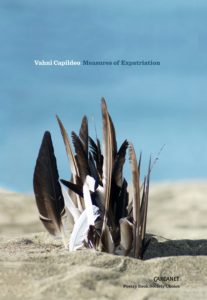

Throughout the nineteenth century, as the British Empire and its official tongue extended across the world, the word “expatriate,” which, as late as 1818 referred to “one who has been banished,” acquired a new definition: “one who chooses to live abroad.” This injection of agency may have turned the tables on its French cousin (expatrier, “to banish”), but settled our modern usage of the term into an uneasy space delineated globally by class, choice, and circumstance: in contrast with the oft-demonized “transient worker” or “economic migrant,” “expatriate” is still the preferred term for the English teacher, aid worker, or multinational consultant. In her latest, defiantly manifold collection, Vahni Capildeo – ever the fastidious lexicographer – sets out to take the measure of the word, challenge its connotations, and test the language she lives in.
Capildeo begins on familiar ground. The volume’s first and last pieces share a dedicatee, and bookend it with wry takes on the two common meanings of “flight.” “Handfast,”which opens the collection, speaks to an imagined creature alighting on Henry VIII’s hunting-glove, now in the Ashmolean Museum in Oxford – “Come here, here, here: / if it’s a tree you’d sulk in, I am pine.” Regal, rooted, the speaker “[stands] fast” to receive a companion as she returns “fierce and sure: / lands, scores, punctures the gloveskin.” The closing piece, “Stalker,” chooses as its foil not a self-assured beast of the air but the stag; symbol of royalty, yet constantly pursued. If the voice in “Handfast” merely calls out to the bird, in “Stalker” she and the frightened deer are one – “The form is from me: / it is him, poem, stag, first sight / and most known.” Ranging from one extreme to another, the other poems hover between lightness and the dead dread of escape. In “Mercy and Estrangement,” for example, the narrator sees another’s heart “hurtling towards” her (“it turns into a bird, turns: / a scavenger bird lightfoot…”); while in “Un Furl,” the penultimate poem, words expand to take on new meanings like a spreading of wings:
This is
it, is
it and it
its itness
it’s itness
[…]
Line after relentless line, the collection weaves between these instantly recognizable images – at times hunter, at times hunted, always airborne.
But it is not flight, in either sense, that ultimately governs its inner rhythm. Movement, in the world Capildeo creates, is more often earthbound and observant: poems like “To London” begin impulsively (“It was necessary to move…”) before leaving a subterranean tunnel for the prosaic, barren geography of a suburb. What surrounds her is not sky but “the view, the barbed wire roaring into view / round and round the playground walltop.” Earlier in the book, another poem, “Investigation of Past Shoes,” lands ballast to a series of memories through footwear. Here, each identity-making recollection (“Purity was attained by the application of a whitener…”) is inseparable from the shoes that hold every step to the ground (“Seven years of these shoes are a chemical memory”). Formally, the weight of walking is mirrored in several long prose narratives threading through the book, interrupting spacious poems with textual blocks that anchor the mind and eye to their pedestrian contours. “Reading could fix me,” the speaker muses in “Too Solid Flesh,” “it could be a way to acquire weight.” This heaviness of prose is also meant to approximate that of the body: Capildeo writes in the same poem of how the mind, “ready to race ahead, […] is impatient when the body, untouched […] begins to shiver.”
In their own way, such reflections pace towards a truth of the expatriate experience. If moving abroad, in Victorian novels and travel advertisements, is a romantic (even flighty) thing to do, we find ourselves dwelling on the mundane frustrations of Passport Control, the Primary Care Trust, and the Schengen Agreement. Other daily obstacles have no proper names: maps and patterns of unfamiliarity, and hostile landscapes that array themselves against feet, not flight. “Again the having to keep walking,” laments the poet in “The Book of Dreams,” “it is a broken way, not meant for pedestrians. The pavements give way to grass verges that dip into the straggle of nothing.” When she encounters the buried violence of the landscape she arrives in, the shock plays out both on the lane and in the language. The narrator of “Snake in the Grass,” recalling Oxford’s hidden histories, cites how the city has renamed undesirable streets, suppressed unruly streams, built “new history” over its Jewish quarter, and “sealed / the wide, one-eyed mercy of a lake / beneath a car park’s sweat.” Today the same cityscape – so eager to conceal the people who do not fit in – easily reveals them to the expatriate’s searching eye: a “woman in white” stands out by an East Oxford road, “flutters,” is “extra familiar.” And in that moment of identification the narrator, unhomed, comes home: “her clothing is old-fashioned North Indian.”
What is most consistently surprising about this book of many revelations is how Capildeo, in these instances of painful recognition, shows difference to be a double-edged sword. Because each identity, as the poet has carefully shown, is a product of personal history, the expatriate’s strategy against violence that generalizes difference – so as to set it apart – is to assert the particularity of her own experience. One harsh encounter is detailed in “All Your Houses.” When a group of men pass the narrator’s house at night, “singing about Pakis,” she does not feel that this is directed against her: after all, “my ancestors left South Asia before the partition of India.” Later, they “change their singing to a theme of detailed lust, singing about women,” and still she “[does] not feel that they are singing about [her]” – since “one of the neighbours must be the woman: I have become the Paki.” Slipping between selves, Capildeo’s chosen narrators maintain their integrity and personhood. The same happens on a more subtle level, for example, when she is quizzed about V.S. Naipaul, her famous relative:
– What about possible animal rights connexions for V.S. Naipaul? Doesn’t he promote vegetarianism?
– But almost nobody in that family is a true vegetarian, myself included. I remember seeing my grandfather splitting a stewed fish skull and picking out the white brains with a fishbone, to eat them. I was only little.
The many-sided pasts, which others would use to define the expatriate become her best defence.
Such a response, of course, generates its own undercurrent of doubt. Take, for instance, the tercet that concludes the poem “I Wish To Be Speaking To You Until Death:” “My skin the wind, it’s gone / kiting; sew how / it is unfit.” “Kiting,” here, retains at its root both Old English identities of “toy” and “bird,” but also resonates with darker, present-day associations: the verb means to “move quickly,” to “force an enemy to follow you around” (in online gaming parlance), or to “issue a cheque with insufficient funds.” Can it be that taking heart in the weightlessness of one’s skin is merely baiting danger, or running on borrowed time? There is nothing flippant about wrapping these anxieties in wordplay; for Capildeo, the malleability of language is precisely the sustaining, reflexive quality that makes it a home for the mind. Even if this means that cursory readers will come up against seemingly inaccessible nooks and crannies of their tongue, the alternative – the bland assimilation of cultural cliché, language without etymology – is akin to a banishment of the self. Nowhere is this more clear than in the poem where Capildeo addresses her present country directly (“In 2190, Albion’s Civil Conflicts Finally Divided Along Norman-Saxon Lines”). “Let’s start a conversation,” her narrator challenges, “ask me where I’m from.” It is no time for easy answers, and less so for easy questions: “what to do if I sound more like you than you do”? If language cannot accommodate difference, then “every word [is] an exhalation, a driving-out.”
The eponymous sequence, “Five Measures of Expatriation,” comes late in the collection, a majestic prose hymn that brings the book’s many paths together. Each section pursues a different connection (“Language is my home,” the narrator declares in one, before questioning the “zigzagging” of words in the next), but it is in part V that Capildeo picks up the loose ends, and turns the searching inwards. One by one, she traces and rejects the outlines of “refugee” (“ever inadequate”), “migrant” (“all movement”), and “exile” (‘the word burns me’), before arriving – still dissatisfied – at “expatriate:” a loose-fitting definition of the self that can only be “a citation” of something else. “I am incited to pluck out the heart of the mystery,” she writes, but will not, or cannot. Perhaps it is better to keep searching, to stretch each melodic measure (“Patria sings an Italian tenor”) to different measurements? “No expiry, please”, the poem concludes, and her question is left unanswered. It is a brave thing to ask.
Reviewed by Theophilus Kwek
Theophilus Kwek is the author of four volumes of poetry, most recently The First Five Storms, which won the 2016 New Poets’ Prize. He served as President of the Oxford University Poetry Society, and is now Editor of Oxford Poetry.
Measures of Expatriation
by Vahni Capildeo
Publisher: Carcanet
Paperback / 128 pages / 2016
ISBN: 9781784101688
To read more book reviews, please click here.
Published on March 1, 2017.




